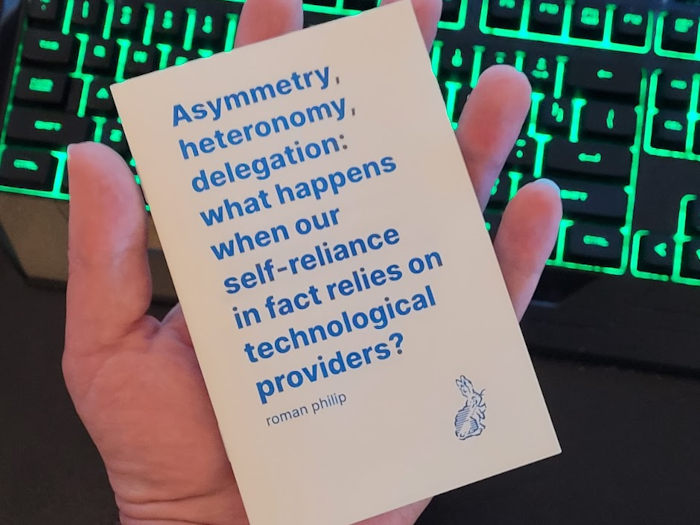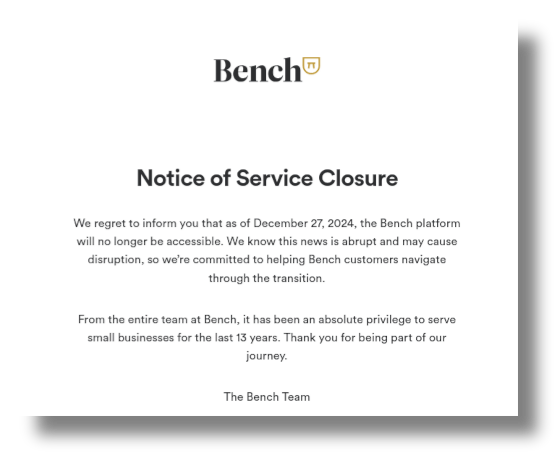Dave's Paper Notes: Asymmetry, heteronomy, delegation: what happens when our self-reliance in fact relies on technological providers?
<< Back to Dave’s Paper Notes.
-
Paper (PDF): Available here: https://pub.yctct.com/asymmetry.html
-
Author: Roman Philip (yctct.com)
-
Year: 2025

Roman graciously sent me a copy of this publication. Look at it! Look at the bunny!
When you break it down, the title says it all:
When we hand over the reigns of our digital lives to online providers this creates an asymmetric relationship. (This is particularly dangerous in the form of "free" (advertisement-driven) or subscription (rented) services.)
Heteronomy can mean subjugation or the state of being beholden to outside forces. Yet it is not simply the opposite of autonomy. When you are influenced or shaped by external forces, say a teacher or parent, that’s heteronomy. It’s neither inherently good or bad, though it’s clearly an asymmetric relationship.
The potential for abuse in both asymmetry and heteronomy are apparent!
But delegation - that’s the more subtle core at the heart of the problem. There’s no obvious moral component to delegation. I perform the daily maintenance of my teeth myself, but I delegate yearly maintenance and inspection to a professional and licensed dentist. I am happy with this arrangement, but it does mean that I’m trusting my dentist to use the equipment correctly and be honest with me.
A better example, and more relevant to technology, might be off-site backups. Of course it is possible to make off-site backup copies of your files without involving a third party. You can store a flash drive in a safety deposit box at the bank. Or exchange drives with a trusted friend or relative. But that’s a level of friction very few people will overcome. A much easier solution is to delegate off-site backups to a trusted company. (I personally use https://tarsnap.com/ and recommend it.)
Asymmetry asks us not to abandon delegation, but to be simply to be mindful about it:
"We’ve been delegating tasks for a long time: to accountants, to bankers, to lawyers, as well as to technologies and machines.
"However, we usually don’t delegate unquestioningly. We know things can go wrong; we know there is always a chance the other party may mislead us. So when we delegate, as far as possible we make sure that there are safeguards in place."
Common sense? Sure. But how many of us actually safeguard our digital selves against tech companies? Blessed few, from what I’ve seen.
Cautionary tales
The booklet begins with an example I’d missed in the tech news. Business accounting service Bench (wikipedia.org) claimed to serve 35,000 small businesses when it suddenly went offline in December 2024! Those businesses all lost access to their accounting data. Instead, the website simply hosted a single page with a message about the business having been acquired. Archive.org has a copy:

I can’t even imagine the amount of hair-pulling and screaming this caused on the part of the small business owners.
As expected, notorious bad actors like Adobe, Microsoft, and Facebook all make appearances.
The point of these examples is clear: There is a stark asymmetry in power between an online service business and its customers. The business holds virtually all of the power and can act in arbitrary and capricious ways.
"But somehow, with digital technologies, we miss something; we do not seem to have figured out what the conditions of delegations are, or what those conditions ought to be. Most of us have been caught in the trap."
(Emphasis mine, and I couldn’t agree more.)
I haven’t quit every big company for online services, but a couple high-profile examples are Microsoft Github, Amazon.com and AWS. For those few I still use (e.g. the Google ecosystem for my Android phone), I have alternatives at the ready which I actively use. Google could disappear tomorrow and I would be very inconvenienced, but it wouldn’t be a show-stopper.
"…some people can no longer exist professionally without a LinkedIn account."
This is the one I’ve struggled with, going back and forth with myself, for a couple years. On one hand: I hate everything about Microsoft LinkedIn - take the ethos by which I live my life and reverse it and you have Microsoft LinkedIn. On the other hand: I have all email alerts turned off and my LinkedIn account is just sitting there. If I deleted it, I lose that history and gain only the satisfaction that I’m no longer visibly participating. (It’s not like my data hasn’t been permanently slurped up into Microsoft’s data sets - let’s not kid ourselves.)
I’m tempted to say that I would never work at a company that wouldn’t hire me because I wasn’t on Microsoft LinkedIn. But is that true? I don’t know. If I can’t get a job, I can’t provide shelter, food, or healthcare for my family. That’s a heck of a thing to risk and they know it.

Engraving of Faust’s pact with Mephisto, by Adolf Gnauth (circa 1840)
Remedies
I often say that while big tech seems invincible and immortal, but most of it would cease to have any power or influence instantly if we all just one day stopped using it. The power is absolutely in our hands. Which is not true of other powers such as militaries or governments.
(This is doubly true for software developers. If every dev turned their back on Facebook/Meta, that’s it. They would be done. But I digress.)
But it doesn’t take some huge collective action to look out for your own interests.
On the individual scale, the answer to all of this is to put a little thought into the delegations you make.
"You can still rely on the servers of a third-party provider to run your accounting system, but you have to take care of the conditions of delegations, so if you’re unhappy with the software, or the provider, you can quit and carry on using the software without the provider.
It is understandable, in a world that sometimes feels like we’re living the rapid-fire lyrics of Billy Joel’s "We Didn’t Start the Fire," that convenient (and free!) options would be very appealing. But there are always trade-offs.
This booklet ends with the promise of future publications, which will have ideas and checklists for everyday people to navigate the trade-offs and avoid falling prey to malevolent asymmetries.
"These technologies are indeed immensely powerful, and therefore contain inherent threats and risks. Our reliance upon them must not, and need not, end up making us, the users of these technologies, powerless and trapped. But for that, we need knowledge."
I agree!
Update: Roman also pointed me to these fantastic discussion notes by Louis Merlin:
There are a ton of great topics and food for thought in there. Like this, for starters:
"Negotiability: When using an analog service, and signing a paper contract, both sides are free to remove or add clauses, and accept or deny the modified version of the contract. This is something that is extremely rare in the digital world, but it should be encouraged. One participant told the anecdote of negotiating a clause with an ISP for a network infrastructure lease, and the ISP agreeing to this modified clause."
The inflexibility of digital services and agreements (as they are currently practiced, not as they would have to be) is an aspect that has long bothered me, but I’d never managed to turn it into such a great explanation!